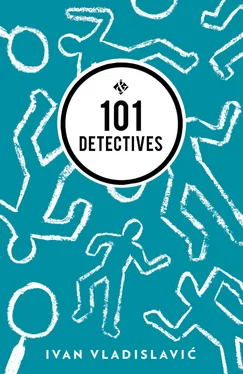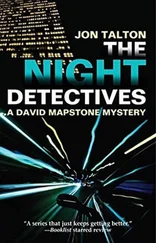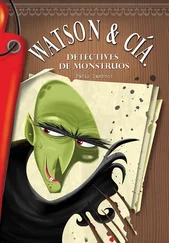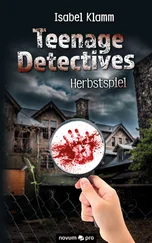Ivan Vladislavic - 101 Detectives
Здесь есть возможность читать онлайн «Ivan Vladislavic - 101 Detectives» весь текст электронной книги совершенно бесплатно (целиком полную версию без сокращений). В некоторых случаях можно слушать аудио, скачать через торрент в формате fb2 и присутствует краткое содержание. Год выпуска: 2015, Издательство: And Other Stories Publishing, Жанр: Современная проза, на английском языке. Описание произведения, (предисловие) а так же отзывы посетителей доступны на портале библиотеки ЛибКат.
- Название:101 Detectives
- Автор:
- Издательство:And Other Stories Publishing
- Жанр:
- Год:2015
- ISBN:нет данных
- Рейтинг книги:4 / 5. Голосов: 1
-
Избранное:Добавить в избранное
- Отзывы:
-
Ваша оценка:
- 80
- 1
- 2
- 3
- 4
- 5
101 Detectives: краткое содержание, описание и аннотация
Предлагаем к чтению аннотацию, описание, краткое содержание или предисловие (зависит от того, что написал сам автор книги «101 Detectives»). Если вы не нашли необходимую информацию о книге — напишите в комментариях, мы постараемся отыскать её.
and
, invites readers to do some detective work of their own. Each story can be read as a story, but many hide clues and patterns. Whether skewering extreme marketing techniques or constructing dystopian parallel universes, Vladislavic will make you look beyond appearances.
101 Detectives — читать онлайн бесплатно полную книгу (весь текст) целиком
Ниже представлен текст книги, разбитый по страницам. Система сохранения места последней прочитанной страницы, позволяет с удобством читать онлайн бесплатно книгу «101 Detectives», без необходимости каждый раз заново искать на чём Вы остановились. Поставьте закладку, и сможете в любой момент перейти на страницу, на которой закончили чтение.
Интервал:
Закладка:
Margery led me downstairs to the flat. It was the only part of the house I had never been in. There was the bed in which Claude had died, covered by a candlewick bedspread through which the quilted lozenges of the bare mattress showed, an empty wardrobe breathing out naphthalene, a shelf containing the eccentric assortment of books he could still tolerate at the end. The four trunks had been pushed against the walls on either side of the bed, the three smaller ones on one side and the largest on the other, beneath the window. Some papers and objects lay on the broad windowsill.
On the bed, resting comfortably against the pillows, lay two stuffed animals, mangy relics of a distant European childhood. He wept when he saw those again, after all the years, Margery said, and told me their names. Nana and the Bear. They were animals of indeterminate species, neither bears nor dogs but something in between.
Together we shuffled through the things on the sill. A tin of China tea, still fragrant after decades in storage, like a flask out of the pyramids. A little calibrated gauge for converting Fahrenheit to Celsius. Photographs, immense enlargements of snapshots, five, ten, twenty copies of the same image.
Meet Claude, she said, picking two or three photos from the pile and handing them to me.
A delicate boy with brown curls, a sweet mouth. This child dressed as a Red Indian, with a nursery-blanket tepee in the background. This child on a rocking horse, with a Roman helmet and a wooden sword.
And Claude again, somewhat older, she said drily, handing me a Technicolor snapshot with a thick white border.
An elderly gentleman, sitting stiffly in a deckchair on some ocean liner, trying without success to recline. The mouth crooked and bitter, the face sharp, a few wisps of hair standing on end in the wind. No trace of the child left, neither the beautiful one with the curls nor any other you could imagine.
After a while, Margery went off to do some chores. Left alone with Claude’s personal effects, I felt like an intruder. I retreated to the most public part of the room — the book shelf — where I picked through the titles and made a few notes in a spiral-bound pad about the areas of interest: the occult, boarding-school stories for girls, great naval battles, the American West, unsolved mysteries, infamous crimes.
The trunks unnerved me. I had the feeling that I was on the brink of an obsession, that once I looked inside one of them, I would never be able to turn back. They lay there like an enormous, obvious drug, which it would be wise not to sample. I should refuse them, I should tell her I wanted nothing to do with them.
Nevertheless, I raised the lid of the smallest container, the wooden chest with leather trim. A musty exhalation escaped, as if the chest had just breathed its last. It was packed with papers, letters in coffee-coloured envelopes, photographs in boxes, calendars. Were these Claude’s papers or his father’s? I had no way of knowing.
The first folder I reached for was full of mementos from sea voyages: itineraries, menus, weather reports, news from the bridge about passages and docking times, certificates issued at the crossing of the equator, featuring a cartoon Neptune with trident raised, sea charts. Here was the plan of a Union-Castle liner in blues and greens, postwar colours that smacked of cocktail lounges and Formica kitchenettes, so crisp you would have thought it had just been printed, with a line of blue ink extending from Cabin 52 on the second-class level out into the sea-blue border, where, on a little raft of blue lines, the following handwritten words floated: Miss van den Broucke.
I came back three times in the next week to look at the trunks, and never got past the surface layer in each one, the thick skin it turned to the world. When I tried to dip below that surface, just to see how deep it was, I couldn’t breathe. I had no idea what to do with the trunks, but before I could bite back the words, I found myself proposing to have them carried to my place.
But you’re about to go away, Margery said.
That’s not a problem. I’ll put them in storage, along with my own stuff, until we decide what to do.
A few days later, I came back with the station wagon to fetch the trunks. We got the street guards to carry them out for us. It’s not the done thing, distracting them from their duties, but they were only too pleased to earn a bit of extra cash — until they felt how heavy the things were. They were strong young men but they sweated over it, and got their paramilitary uniforms so dirty I felt obliged to double the fee we’d offered.
Besides the trunks, I took Claude’s personal library, packed into cardboard boxes. In the end, three trips were needed to carry everything to my house. Nana and the Bear stayed behind. At their age, we agreed, they would not survive the move.
The trunks stood in the spare room. The house, already made uneasy by my impending departure, felt this shapeless new memory in a back room of its mind, a name that would not come to the tongue. A stranger’s past was seeping out into the troubled air, dragging the hands of the clock back just when they should have been hurrying forward.
Now that it was done, I could not believe I had brought these things here. In six weeks, I would be leaving (the house had already been let), and I had a mountain of things to sort through and pack up before then. I had gathered the necessary stock of cardboard boxes, garbage bags, mothballs, plastic packaging tape, indelible markers. I had a past of my own to order, and that was what I should have been doing, instead of sitting in this hot, stuffy room — the sash window had been jammed for years: another repair I never got round to — going through Claude’s trunks.
On a cursory examination, the contents fell into three categories: books, papers, things.
The books. Most of those in the trunks had belonged to Berti, Margery said. Claude had sold off nearly all his own books when he moved to Somerset Road. Those he’d kept, which had been on the shelf in his flat, were now in five or six separate boxes. In any event, I could tell by the age of the books and the fact that most of them were in German and French that they had belonged to the father. Some of the books for children, the treasures of that unimaginable boy with the sweet mouth and the adorable curls, had his name in the covers. There were some beautiful storybooks, things that could have been collectors’ items, had they not been scribbled all over with crayons.
The things. Berti’s cut-throat razors. Pillboxes, wallets, portfolios. Twelve pairs of glasses with nearly identical round black rims: every pair Berti ever owned. A broken compass. Cigarette tins with smaller objects rattling around in them (eye teeth, tiepins, a crumbling scarab). Claude’s baby shoes. A lock of blond hair in a wax-paper envelope.
The papers. Bundles of letters. Generations of family correspondence (Claude to his mother from boarding school in Manchester, Berti to the family from his many trips abroad). Albums of postcards. Photographs from the turn of the century: hand-tinted, mounted on ivory boards joined by silken ribbons, with tracing paper spread over them like veils. Photographs from mid-century: glossy stacks like playing cards, with thick white borders or deckle edges, a profusion of prints. Forty years of pocket diaries. Schoolbooks, passports, maps, itineraries, stock sheets, calling cards, university notes, newspaper clippings. Death notices edged in black. Wedding invitations, certificates, receipts, bundles of sheet music. A recipe book in black-letter type.
I examined and classified, opened tins and envelopes, and made lists and notes. There were papers in English, French and German. I had gathered from Margery that Claude was German-speaking, although he’d spent part of his childhood in France and his youth in England. That might be helpful for creating order and I made some notes to that effect. Afterwards, I returned everything as nearly as possible to the place I had found it, as if the disposition of things in the trunks might contain a revealing narrative of its own. But my cataloguing did not disperse the haze of irretrievable significance that hung between me and these things.
Читать дальшеИнтервал:
Закладка:
Похожие книги на «101 Detectives»
Представляем Вашему вниманию похожие книги на «101 Detectives» списком для выбора. Мы отобрали схожую по названию и смыслу литературу в надежде предоставить читателям больше вариантов отыскать новые, интересные, ещё непрочитанные произведения.
Обсуждение, отзывы о книге «101 Detectives» и просто собственные мнения читателей. Оставьте ваши комментарии, напишите, что Вы думаете о произведении, его смысле или главных героях. Укажите что конкретно понравилось, а что нет, и почему Вы так считаете.












